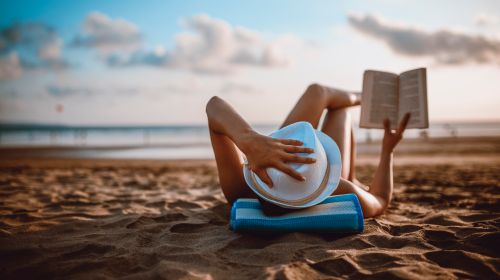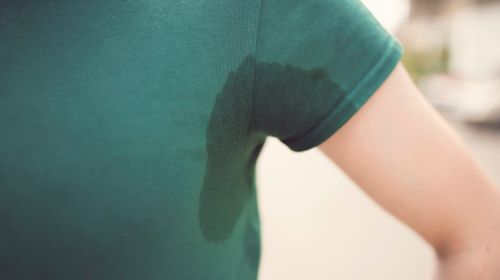Heat collapse, also known as heat exhaustion, is the most common form of heat damage. Elderly people, small children and the chronically ill are particularly at risk. In certain situations, heat stress can also become a problem for young and healthy people.
- The best way to prevent heat collapse is by drinking a lot and wearing a hat.
- © iStock.com/Ridofranz
Midsummer temperatures have their downsides: When it is very hot, the body's own heat regulation mechanisms are particularly challenged in order to keep the body temperature at the target value of around 37 degrees Celsius. In the elderly, small children or the chronically ill, the heat regulation mechanisms are not yet as effective (small children and infants) or restricted. For this group of people there is an increased risk of heat collapse or heat exhaustion on hot days.
How can a heat collapse occur on hot days?
Those who are young and healthy can cope better with heat stress, but are not immune to heat damage such as heat collapse. Physical exertion at high ambient temperatures, especially when there is high humidity, promote the development of a heat collapse. Risk factors also include a lack of air circulation in the heat.
This can become a problem with large gatherings of people in public places or in stadiums, for example during public viewing during the World Cup. This is shown, among other things, by media reports from the Soccer World Cup 2010: The Augsburger Allgemeine reported, for example, of 15 people who had to be treated during just one public viewing event due to the heat exposure "mainly because of heat exhaustion".
Lack of fluids stresses the circulation
But what happens in the event of a heat collapse? Our main mechanism for regulating heat is sweating. The sweat cools the skin through evaporation. When you sweat heavily, the body loses a lot of fluids and minerals. If you do not compensate for this by drinking enough water, there will be a lack of fluids and the blood volume will decrease. Less blood fluid means lower blood pressure. Another mechanism for heat regulation adds additional stress to the circulatory system: the blood vessels under the skin widen and absorb more blood in order to improve the heat dissipation through the skin.
Symptoms of a heat breakdown
This can lead to the typical symptoms of heat collapse or heat exhaustion:
An important difference to heat stroke: no high fever
The body temperature is not or hardly changed. This is an important difference to heat stroke, the most dangerous heat damage, the main symptoms of which include a greatly increased body temperature to over 40 degrees Celsius and hot, dry skin.
Circulatory problems in heat: what to do?
TargetVideo
Therapy for heat collapse: drinking and resting in the shade
If you or another person notice symptoms of heat exhaustion, you should act immediately: Anyone who is heat exhausted should get out of the sun and lie down to relieve the circulation. Every effort is to be avoided. Mineral drinks like mineral water or broth help to compensate for the lack of fluids and minerals. A light blanket can be useful if you are cold. Usually these measures are sufficient and the person will recover over time. If it comes to unconsciousness, the emergency doctor must be called and the person affected must be brought into a stable lateral position.
This is how you prevent heat collapse
Like other heat damage, you can prevent heat collapse or heat exhaustion by being in humid and warm weather
- wear light, breathable clothing;
- drink a lot, at least two to three liters a day;
- Avoid alcohol, as it puts additional stress on the circulation;
- Avoid physical exertion in extreme heat. Relocate it to the cooler morning or evening hours;
- Avoid direct sunlight, especially between 11 a.m. and 3 p.m.
- do not go into the sun without a hat.
Provide cooling for those in need of care
If you are caring for an elderly or sick person, it is important, in addition to the measures mentioned to prevent heat exhaustion, to ensure sufficient cooling in this person's living area: for example with fans. In addition, a drinking schedule can be useful so that the person in need of care drinks enough. Also, keep in mind that certain medications, such as sedatives, antidepressants, diuretics, and various antihypertensive agents, can worsen your ability to adapt to heat. If you or someone you care for is taking medication on a long-term basis, you should talk to your doctor about whether it makes sense to change your medication during a heatwave.
Children are particularly sensitive to heat
In addition to the elderly and the sick, children are particularly prone to heat damage. The professional association of paediatricians advises parents, among other things, not to let the little ones romp outside when the temperature is above 25 degrees Celsius between eleven and 4.30 p.m. and to give them twice to three times as much to drink at temperatures above 30 degrees Celsius as they do otherwise.
In addition, nobody should be in the sunshine in general. Because of the lack of air circulation in the narrow space, the temperatures in the vehicle quickly rise to critical values, which can trigger heat collapse or, worse, heat stroke.
First aid for sunstroke
TargetVideo


